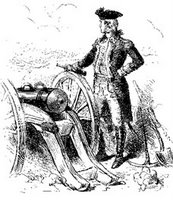Cannonade and Bombardment from Phipps’s Farm
 Back to selectman Timothy Newell’s diary! I skipped his entry for the 13th since it was just an update on the ongoing war at sea over supply ships:
Back to selectman Timothy Newell’s diary! I skipped his entry for the 13th since it was just an update on the ongoing war at sea over supply ships:
News of several more Store Ships being taken by the Continental Privateers and whale boats.The real excitement came on 17 Dec 1775, as the Americans opened up a new artillery battery on Phipps’s point, a part of east Cambridge that then stuck out into the Charles River. This was where the British light infantry and grenadiers had landed on 18 April after crossing the river on their mission to Concord.
Newell wrote, noting in passing that the Continental soldiers were working on a Sunday:
Sabbath morning was discovered new works going on at [David] Phips’s farm very near—upon which a cannonade and bombardment ensued and continued the 18, 19, and 20 [of December], from the Battery’s of Charlestown and Boston Point. The man of war of 32 guns which lay opposite kept a constant fire. The first day a shot from Millers hill took her quarter and went thro’ and thro’ her—I’m not sure who “young Dr. Paddock” was. A Dr. Adino Paddock from Boston settled in New Brunswick after the war, but he was only fifteen years old at this time, and that would be very young indeed. Perhaps “Dr.” is a mistake by the transcriber. Perhaps he was already training in medicine under Dr. Lloyd.
a shot the next day passed my house and struck young Dr. Paddocks hat upon his head, as he was on Dr. [James] Lloyd’s hill, the ball fell into his yard. The man of war slipt away in the night.
It would have been sadly ironic if a shot from the American lines had hit young Paddock’s head rather than his hat. His father, also named Adino Paddock, had commanded the Boston artillery company before the war, and thus helped to train many of the Continental artillerists besieging the town.
TOMORROW: An American artillery engineer’s view.

4 comments:
Does Newell's diary mention anything about the British attempt on the Dorchester Heights? I believe a storm stopped the British from advancing, but I would be interested in learning what the city was like during this likely attack.
Also where can you find this diary online?
I haven’t found Timothy Newell’s diary online, which is one reason I’m posting the entries from it. It was published in an 1852 volume of the Collections of the Massachusetts Historical Society.
Newell does write about the abortive British attempt on Dorchester Heights on 5 Mar 1776. As one of the selectmen left in Boston, as well as a property-owner, he was very busy over the following days trying to preserve the town from bombardment by the Americans, looting by evacuating British, and the threat of fire from both sides.
Jon,
Is there any chance the Phipps Farm House is still standing? Someone told me there is a very old structure somewhere near where Lechmere used too be.
Gene Blumenreich
According to An Historic Guide to Cambridge (1907), William Winthrop bought the property that included the Phips mansion around 1811 and tore down the building to put up a new one.
Post a Comment